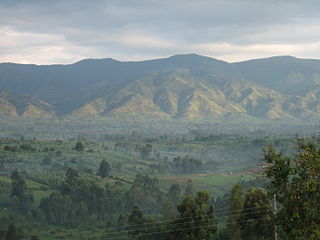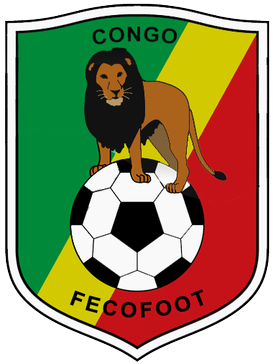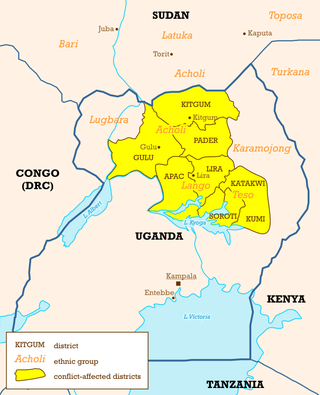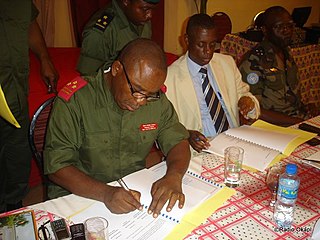| |||||
| Decades: | |||||
|---|---|---|---|---|---|
| See also: | Other events of 2010 History of the DRC | ||||
The following lists events that happened during 2010 in the Democratic Republic of the Congo .
| |||||
| Decades: | |||||
|---|---|---|---|---|---|
| See also: | Other events of 2010 History of the DRC | ||||
The following lists events that happened during 2010 in the Democratic Republic of the Congo .

Kinshasa, formerly named Léopoldville until 30 June 1966, is the capital and largest city of the Democratic Republic of the Congo. Kinshasa is one of the world's fastest-growing megacities, with an estimated population, in 2024, of 17,032,322. It is the most densely populated city in the DRC, the most populous city in Africa, the world's fourth-most-populous capital city, Africa's third-largest metropolitan area, and the leading economic, political, and cultural center of the DRC. Kinshasa houses several industries, including manufacturing, telecommunications, banking, and entertainment. The city also hosts some of DRC's significant institutional buildings, such as the People's Palace, Palace of the Nation, Court of Cassation, Constitutional Court, African Union City, Marble Palace, Martyrs Stadium, Government House, Kinshasa Financial Center, and other national departments and agencies.

The Democratic Republic of the Congo (DRC), also known as DR Congo, Congo-Kinshasa, or simply Congo, is a country in Central Africa. By land area the country is the second-largest country in Africa and the 11th-largest in the world. With a population of around 111 million, the Democratic Republic of the Congo is the most populous nominally Francophone country in the world. The national capital and largest city is Kinshasa, which is also the economic center. The country is bordered by the Republic of the Congo, Central African Republic, South Sudan, Uganda, Rwanda, Burundi, Tanzania, Zambia, Angola, the Cabinda exclave of Angola, and the South Atlantic Ocean.

Douglass Township is a township in Montgomery County, Pennsylvania, United States. The population was 10,195 at the 2010 census.

The Congo Free State, also known as the Independent State of the Congo, was a large state and absolute monarchy in Central Africa from 1885 to 1908. It was privately owned by King Leopold II, the constitutional monarch of the Kingdom of Belgium. In legal terms, the two separate countries were in a personal union. The Congo Free State was not a part of, nor did it belong to Belgium. Leopold was able to seize the region by convincing other European states at the Berlin Conference on Africa that he was involved in humanitarian and philanthropic work and would not tax trade. Via the International Association of the Congo, he was able to lay claim to most of the Congo Basin. On 29 May 1885, after the closure of the Berlin Conference, the king announced that he planned to name his possessions "the Congo Free State", an appellation which was not yet used at the Berlin Conference and which officially replaced "International Association of the Congo" on 1 August 1885. The Free State was privately controlled by Leopold from Brussels; he never visited it.

In anthropology, pygmy peoples are ethnic groups whose average height is unusually short. The term pygmyism is used to describe the phenotype of endemic short stature for populations in which adult men are on average less than 150 cm tall.

North Kivu is a province bordering Lake Kivu in the eastern Democratic Republic of the Congo. The capital city is Goma. Spanning approximately 59,483 square kilometers with a population estimate of 8,147,400 as of 2020, it is bordered by Ituri Province to the north, Tshopo Province to the northwest, Maniema Province to the southwest, and South Kivu Province to the south, as well as Uganda and Rwanda to the east.

South Kivu is one of 26 provinces of the Democratic Republic of the Congo (DRC). Its capital is Bukavu.

The Second Congo War, also known as Africa's World War or the Great War of Africa, was a major conflict that began on 2 August 1998 in the Democratic Republic of the Congo (DRC), just over a year after the First Congo War. The war initially erupted when Congolese president Laurent-Désiré Kabila turned against his former allies from Rwanda and Uganda, who had helped him seize power. Eventually, the conflict expanded, drawing in nine African nations and approximately 25 armed groups, making it one of the largest wars in African history.

The DR Congo national football team, recognised by FIFA as Congo DR, represents the Democratic Republic of the Congo in men's international football and it is controlled by the Congolese Association Football Federation. They are nicknamed Les Léopards, meaning The Leopards. The team is a member of FIFA and the Confederation of African Football (CAF).

The Congo national football team represents the Republic of the Congo in men's association football and is governed by the Congolese Football Federation. They have never qualified for the World Cup, but did win the Africa Cup of Nations in 1972. They also won the All-Africa Games football tournament in 1965. The team is also a member of both FIFA and the Confederation of African Football (CAF).

The Ituri conflict is an ongoing low intensity asymmetrical conflict between the agriculturalist Lendu and pastoralist Hema ethnic groups in the Ituri region of the north-eastern Democratic Republic of the Congo (DRC). While the two groups had fought since as early as 1972, the name "Ituri conflict" refers to the period of intense violence between 1999 and 2003. Armed conflict continues to the present day.

The Kivu conflict is an umbrella term for a series of protracted armed conflicts in the North Kivu and South Kivu provinces in the eastern Democratic Republic of the Congo which have occurred since the end of the Second Congo War. Including neighboring Ituri province, there are more than 120 different armed groups active in the eastern Democratic Republic of Congo. Currently, some of the most active rebel groups include the Allied Democratic Forces, the Cooperative for the Development of the Congo, the March 23 Movement, and many local Mai Mai militias. In addition to rebel groups and the governmental FARDC troops, a number of national and international organizations have intervened militarily in the conflict, including the United Nations force known as MONUSCO, and an East African Community regional force.

The Lord's Resistance Army (LRA) is a Christian extremist organization operating in Central Africa and East Africa. Its origins were in the Ugandan insurgency (1986–1994) against President Yoweri Museveni, during which Joseph Kony founded the LRA in 1987.

The Republic of the Congo, also known as Congo-Brazzaville, the Congo Republic or simply either Congo or the Congo, is a country located on the western coast of Central Africa to the west of the Congo River. It is bordered to the west by Gabon, to the northwest by Cameroon, to the northeast by the Central African Republic, to the southeast by the Democratic Republic of the Congo, to the south by the Angolan exclave of Cabinda, and to the southwest by the Atlantic Ocean.

The 2008 Christmas massacres were a series of attacks in several villages in Haut-Uele District, Democratic Republic of the Congo by the Lord's Resistance Army (LRA) on 24–27 December 2008.

The 2009 Eastern Congo offensive was a joint Congo-Rwanda military offensive against the Hutu Democratic Forces for the Liberation of Rwanda (FDLR) rebel group descended from those groups that carried out the 1994 Rwanda genocide. Two operations were carried out: 'Kimia II' and 'Umoja Wetu.' 'Kimia' can be translated as 'calm.' "Umoja Wetu" is Swahili for "Our Unity".

The Allied Democratic Forces insurgency is an ongoing conflict waged by the Allied Democratic Forces in Uganda and the Democratic Republic of the Congo, against the governments of those two countries and the MONUSCO. The insurgency began in 1996, intensifying in 2013, resulting in hundreds of deaths. The ADF is known to currently control a number of hidden camps which are home to about 2,000 people; in these camps, the ADF operates as a proto-state with "an internal security service, a prison, health clinics, and an orphanage" as well as schools for boys and girls.

The Katanga insurgency is an ongoing rebellion by a number of rebel groups in the Democratic Republic of the Congo, some of which aim for the creation of a separate state within Katanga. While the insurgency has been active in various forms since 1963, insurgent groups have recently redoubled their efforts after the 2011 jail break that freed Gédéon Kyungu Mutanga, who commanded the majority of the Katangese separatist groups until his surrender to Congolese authorities in October 2016.

From 1885 to 1908, many atrocities were committed in the Congo Free State under the absolute rule of King Leopold II of Belgium. These atrocities were particularly associated with the labour policies, enforced by colonial administrators, used to collect natural rubber for export. Combined with epidemic disease, famine, and falling birth rates caused by these disruptions, the atrocities contributed to a sharp decline in the Congolese population. The magnitude of the population fall over the period is disputed, with modern estimates ranging from 1.5 million to 13 million. The atrocities have been variously referred to as the Rubber Terror and by some as the Congolese Genocide, though the latter characterization is disputed.
Events in the year 2021 in the Democratic Republic of the Congo.